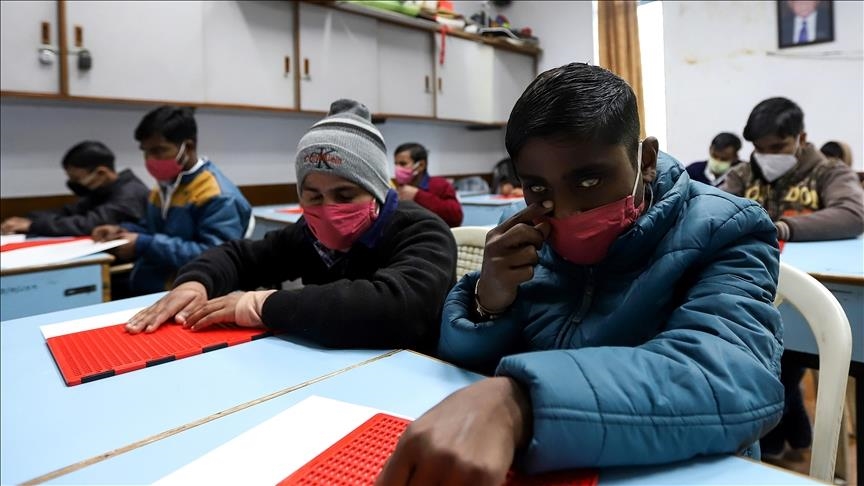Focus on education to prevent brain drain, Indian experts urge government
While Indians heading top global companies attract praise, coinciding Non-Resident Indians Day, experts say it signifies brain drain and call for creating opportunities in country

NEW DELHI
From Google's Sundar Pichai to Microsoft's Satya Nadella, Adobe's Shantanu Narayen to IBM's Arvind Krishna, at least 10 Indian-origin executives are spearheading the world’s biggest companies.
While their feat has been making headlines and winning praise back in India, there are others, who believe that it represents brain drain. They have urged the government to focus on quality education and create job opportunities to prevent talent to serve other countries.
Speaking to Anadolu Agency, coinciding with the Non-Resident Indian Day which is being observed on Sunday, Dheeraj Sanghi, a former professor at the prestigious Indian Institute of Technology (IIT), said improving the education system was of utmost necessity to prevent people to go abroad.
“Most of these people who are now running the top companies had gone abroad as students. They got degrees from good institutions and then got good jobs. So, we need to focus on improving the education system," he said.
Quoting officials, The Times of India – a largely circulated English-language daily newspaper – recently reported that over 100,000 Indians surrendered their citizenship in the first nine months of 2021, and more than 600,000 Indians renounced their citizenship over the last five years.
According to the UN World Migration Report 2020, India had the largest number of migrants living abroad (17.5 million).
The National Science Foundation, the highest scientific body of the US, in a report published in 2015 had mentioned that migration of Indian scientists and engineers had increased by 85% since 2003.
Arun Kumar Grover, a former vice-chancellor of Panjab University, told Anadolu Agency that the primary reason for youth opting to move abroad was because abroad there are good options available in terms of opportunities, which a person may not get easily in India.
Create opportunities
He said as the country is approaching to celebrate 75th of its independence in August, there is a need to put more effort into creating good opportunities available to the youth in the country itself.
"The overall aim should be to make India a place, where the talent who are working abroad now, should look forward to coming to India and contributing to the rapid development of the country post-pandemic. A system has to come up, where the experts can be enticed to sit and look for solutions to these problems," he said.
Last month, when a question was asked on "brain drain phenomena" in the Indian parliament, the Education Ministry in a written response said that the "government is committed to not only retain the students passing out of the premier educational institutions in the country but also attract the non-resident Indians back to the country”.
Sangeeta Gupta, senior vice-president of the National Association of Software and Service Companies, said that several years ago, opportunities in the field of technology did not exist much in India which forced many to look for options abroad. She said that opportunities are opening up in India now.
"Very interesting things are now happening in the Indian market also…the startup movement is visible in India," she said, adding that "the cross-pollination is an important factor which is helping India and should continue.”
According to Gupta, more focus is needed in core research and development sectors, in which India is still lagging. She said that not enough professionals are coming forward to undertake core research and development in India.
She said the government must find ways to build a Stanford-like environment, where academics and students co-invent big things.
"I think more initiatives which focus on the industry-academia partnership with core research, which a lot of such good professionals in the US are already doing. I think that is an area I can identify where we need some amount of government support,” she said, arguing that for professionals there should be open borders.
Caste angle
Some experts maintain that India’s caste system also plays a role in the brain drain and getting top positions abroad.
"In India, the dominant caste elites migrated early and they had the first-mover advantage. Now, the current generations of these are reaping the benefits of social-caste-family connections and networks built over years. They are the same who oppose caste-based reservation (affirmative action program) in India," said Dilip Mandal, an author and former journalist.
He claimed that Indians who have got top posts abroad belong to upper caste strata and in the US, they mostly take advantage of affirmative action programs, meant for racial minorities.
Even in India, he said most companies are headed by people from the Bania caste (third in the hierarchy of the Hindu caste system).
"Because most corporations in India are traditionally family-owned and, in many of them, the biggest stakeholder or the promoter group, provides the top posts," he said, adding that in both situations "kinship, familial relations, and caste-affiliation is playing a role in selecting the top posts.”
Anadolu Agency website contains only a portion of the news stories offered to subscribers in the AA News Broadcasting System (HAS), and in summarized form. Please contact us for subscription options.







